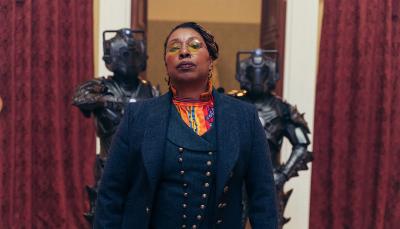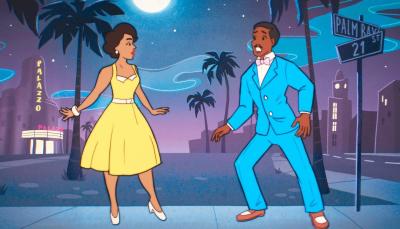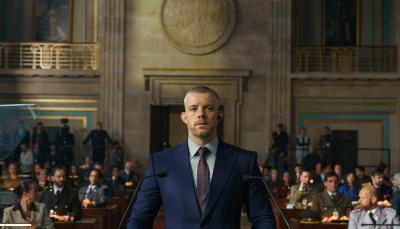With "The Star Beast," 'Doctor Who' Turns 60 By Reaffirming Its Commitment to Hope and Heart
David Tennant in "The Star Beast"
(Photo: Disney+/BBC Studios)
Iconic sci-fi series Doctor Who turned 60 years old this weekend, the sort of milestone which in and of itself is worthy of commemoration. That it did so with "The Star Beast," the first of three special episodes dedicated to this achievement is perhaps even more remarkable, an episode that not only manages to offer emotional closure to a story from fifteen years in its past, but also reminds us why we'll all be (hopefully) watching this show for decades more to come.
Doctor Who is a story about many things: A two-hearted alien who travels the stars in a blue police box, a series of (usually) human companions who have the opportunity for the adventure of a lifetime, a world (alien or otherwise) that is made better not through war or weapons, but compassion and kindness. Not only does "The Star Beast" bring back two beloved performers --- and we'll get to how wrong I was about David Tennant's return in a minute --- the episode encompasses everything that makes the franchise great: Heart, hope, deep and abiding friendship, the reminder that we are never defined by our worst mistakes, that our connections with one another are ultimately what saves the world. It is a beauty of an hour, drenched in nostalgia and respect for all that has come before, but with a forward-looking sensibility that should excite fans both old and new about where this show is going.
The return of former showrunner Russell T. Davies -- armed with a heavy dollop of Disney money, just look at those sets! --- is a triumph, leaning fully into the show's most ridiculous elements, complete with over-the-top villains, nonsensical explanations for complex events, exploding houses, meaningless technobabble, and lots and lots of running. There is no moment of this episode that doesn't feel entirely like coming home, and while its solutions to several major events (such as the DoctorDonna metacrisis) are wildly convenient and/or handwave-y, the emotional beats are all so spot-on, you won't care.
"The Star Beast" reintroduces Tennant as the Doctor --- ostensibly, he's playing Fourteen now, rather than Ten --- a bit older, a bit wearier, confused about why he's wearing an old face. And it's like he never left. There is not a tremendous amount of difference (at least not yet) between Tennant's two incarnations. He's got glasses now, and that's hot, but his Fourteenth Doctor appears to be just as skinny, as fast-talking, and as quippy as ever. He's literally climbing walls at one point, as well as pulling out a barrister's wig to hold an impromptu Shadow Proclamation Court in a car park. There's even an allons-y! (Because of course there is.) Tennant is good, obviously, he's so used to playing this part he basically breathes and embodies the Doctor.
There's grief in his performance, yes, and genuine regret. Real fear over what his return might mean for Donna's life. And a quiet streak of loneliness that highlights how, despite his best efforts, truly apart from the world his Doctor is. Tennant's always been great at holding a multitude of emotions under the surface of his Time Lord silliness, and "The Star Beast" is no different. There are excellent small moments of fun --- Fourteen's realization that his psychic paper hadn't yet caught up with his gender change, his genuine confusion every time someone shouted the name Rose in his presence, literally every interaction he has with Sylvia Noble --- but if you're looking for some any sort of genuine introspection about this regeneration that goes beyond the whole "the universe is being drawn to Donna Noble again" you won't really find it here.
But, obviously, of us aren't really here to see how a former Doctor creates a new one, we're looking for the emotional closure that was denied to Catherine Tate's Donna all those years ago. Season 4 finale "Journey's End" concluded with Donna not only losing all her memories of the Doctor in the name of saving her life, but all her own understanding of how much she grew during her time with him, the things she had discovered herself capable of. It was an awful ending for one of the franchise's best characters, and even if this episode only existed to fix that mistake, it would be worth it.
The actual plot of the episode is....well, it's a Doctor Who episode, with all the good and occasionally dumb things that implies. Things keep happening around Donna Noble, including a spaceship crashing into London piloted by a cute creature known as the Meep. This inevitable piece of merchandising --- which actually originates in a 1980s comic in Doctor Who Magazine --- claims they're being chased across the stars by a squad of Wrarth soldiers dedicated to wiping out Meep kind. If you know anything at all about the Meep, you know that's not entirely true, and the "The Star Beast" has a lot of fun playing with mistaken assumptions based on which alien creatures happen to appear cute and which look like threats. Along the way, London finds itself on the brink of destruction yet again (it is almost Christmas!), as Donna slowly realizes she has to do what she can to help the strange man in the tight suit.
One of the best parts about the first Davies era --- and something neither Steven Moffat or Chris Chibnall managed to recreate to the same degree-- was its dedication really exploring those around the Doctor, and the ways their interactions with him changed not just the technical aspects of their lives but the granular nature of who they were as people. And despite the fact that Donna can't remember the Doctor, she's still living a life that's been touched by her time with him. She gave away the fortune she won in the lottery at the end of "The End of Time," and she's almost fanatically driven to help those in need, though it's clear she's never really thought all that much about why. She's fiercely protective of her trans daughter Rose, and has clearly built a healthier relationship with her own mom than we've seen before. She's grown into a better, even more ferocious version of herself, and though she might never have known why, it's clear that part of who she is now is still because of who she became then.
That the whole metacrisis thing would ultimately be solved by way of her daughter's existence is the sort of obvious trick you kind of feel dumb for not spotting immediately, simply because it makes so much sense in the kind of perfect but generally nonsensical way that things on this show tend to make sense. But it's a twist that's so lovely that it's kind of hard to care. That Rose's transgender identity is a key plot point precisely because it reflects the idea that Time Lords aren't particularly limited by things like gender or sex is the sort of heartfelt political statement Davies excels at making, and it feels nothing but appropriate that Doctor Who, of all sci-fi properties, should so stridently plant its proverbial flag in support of trans kids. It's basically what this show is for, after all.
When it was initially announced that Tennant would be returning as the Doctor, some people (read: me) were rightly skeptical. Surely this couldn't be more than a marketing stunt, aimed to coax back the viewers who'd abandoned the show in the wake of a few lackluster seasons (or who disliked the prospect of a woman playing the Doctor). And, perhaps, on some level, it is those things. It certainly doesn't hurt that the show is marking its move to a new streaming home with the return of one of the most popular actors in franchise history. But, that's definitely not at all it is. (I was wrong, and I've rarely been happier to say so.)
At its heart, "The Star Beast" isn't a reset button or even a reunion episode as we traditionally understand them. Instead, its focus is on how these characters --- even the Doctor --- have changed in the decade and a half since we saw them last, how both they and the show itself have been transformed over time. Tennant and Tate's chemistry is undimmed, but the relationship between the Doctor and Donna has different edges now, and no matter where the TARDIS is whirling them off to as this hour ends, they'll still have to figure out what that means for them. Who is Donna Noble, now that she remembers what it's like to carry the knowledge of the Time Lords in her mind? Who is the Doctor now that this is one grief he no longer has to carry? Who will Rose become now that she understands that so much of her own past is built from pieces of her mother's, her Etsy creatures are based on Daleks and Cybermen, and part of a world she never realized she knew?
These are questions that the two remaining specials will hopefully delve further into, but if "The Star Beast" is anything to go by, it may just be time to stop worrying and trust that Davies still has a very clear vision for what this show should be and do. Doctor Who is like nothing else, still, sixty years on, and this episode will likely leave many feeling nothing but gratitude for that fact.
Doctor Who's second 60th anniversary special, "Wild Blue Yonder," will premiere on December 2. "The Star Beast" is currently streaming on Disney+.




